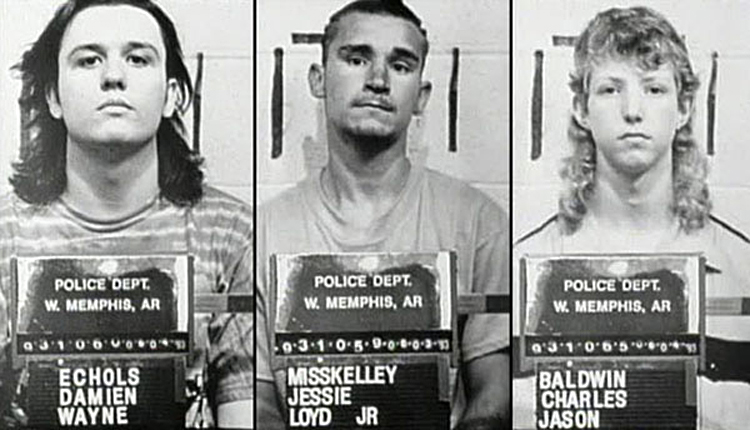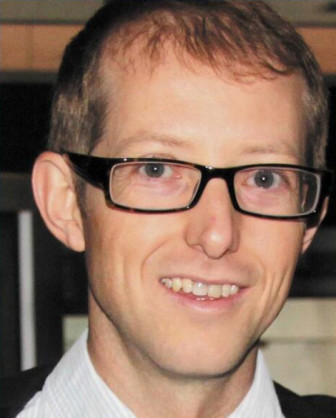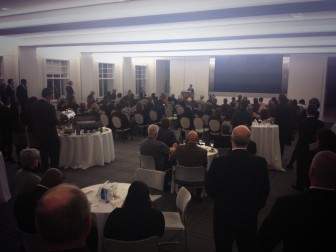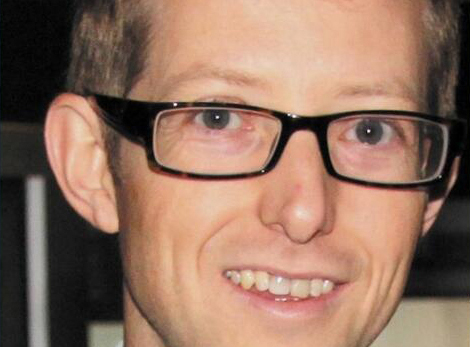
West Memphis Police Department via CBS News / Wikipedia
West Memphis Police Department mug shots of the "West Memphis Three"
WASHINGTON – Jason Baldwin hopes to spare others from growing up, growing old – and dying – in prison.
Baldwin, who was sentenced to life without parole at 16 for a crime he did not commit, served 18 years and since his release in 2011 has become a crusader against sentencing youths to life without parole. He is one of the “West Memphis Three” – who as teenagers in 1994 were convicted of the 1993 murders of three boys in West Memphis, Ark.
The 36-year-old Baldwin, who now lives in Seattle, brought his message to the nation’s capital Wednesday night at an annual reception and fundraiser of the Campaign for the Fair Sentencing of Youth, a national organization that seeks to abolish life-without-parole sentences for all youth.

Campaign for the Fair Sentencing of Youth
Jason Baldwin
“I cannot believe that we are a society where we would place no value in people who have made a mistake -- no matter how terrible -- at a young age,” Baldwin told JJIE.org.
He spoke of convicted murderers he met in prison who in 1994 showed no remorse and who he believed at the time deserved to spend life in prison.
But he said he has seen them transformed over the years.
“I’ve seen them grow, I’ve seen them mature, I’ve seen them take advantage of any opportunity they can to teach themselves, to learn things, to nurture and to be caring and compassionate,” Baldwin said.
He recalls sitting in prison in Arkansas with other inmates convicted of murder.
“I saw them. They led very respectable, responsible lives in prison,” he said. “They took opportunities to educate themselves, to help one another. And that’s the key right there. They helped each other. They helped me. They helped anybody they could, and they cared about people.
“So now these guys who did those things, who exhibited no regard for life, turned around and they showed care, they showed empathy. So they developed those somewhere along the way and will help people and care for people and, if put in the situation they were in to earn their time, they would never do [the same crime] again.”
Baldwin says he’s hopeful society will ultimately decide against life sentences without parole for juveniles.
He points to U.S. Supreme Court decisions, including Miller vs. Alabama, in which the high court ruled last year that mandatory life sentences without the possibility of parole for juveniles are unconstitutional.
Baldwin, one of four honorees at the CFSY event, found a receptive audience, including people who had been incarcerated as juveniles but have since been released, families of those who have been incarcerated since they were juveniles as well as lawyers and advocates for children.
He says he intends to continue campaigning against life-without-parole sentences for juveniles until they’re abolished. Baldwin said he has earned an associate’s degree and plans to write a memoir before returning to school to receive a bachelor’s degree, after which he hopes to attend law school.

Campaign for the Fair Sentencing of Youth.
Healing and Hope, the annual reception and fundraiser of the Campaign for the Fair Sentencing of Youth.
Jody Kent Lavy, CFSY’s director and national coordinator, said at the reception that a lot of progress has been made in the past year toward eliminating life-without-parole sentences for children but that big challenges remain.
Lavy noted the Miller vs. Alabama decision and said, “Children who were told they were worth nothing more than death in prison have lawyers and have people fighting for them to get them back into court.”
She pointed out that Delaware, Texas and Wyoming have abolished life without parole for children within the past year.
And, Lavy said, “More policymakers and judges than ever before understand the fundamental differences between children and adults, understand that it is inappropriate and irresponsible to sentence our children to die in prison.”
The Supreme Court has noted juveniles’ brains are not fully developed and young people are more susceptible than adults to peer pressure, more impulsive, more likely to take risks, less likely to consider long-term consequences and more amenable to rehabilitation.
But the progress notwithstanding, Lavy said state legislatures have passed legislation sanctioning life without parole for children and that some states, including Pennsylvania and Louisiana, have said the Miller decision is not retroactive, meaning it wouldn’t apply to those in prison now who were sentenced as juveniles before the decision.
The others honored at the CFSY reception were:
-
Sara Kruzan, who was sentenced to life in prison without the possibility of parole in California when she was 16 for killing someone who reportedly had sexually abused her for years. Kruzan was released Oct. 31 after a California judge made her immediately eligible for parole. While incarcerated, Kruzan, described as a model prisoner, had mentored women inside and outside prison, earned an associate’s degree and is working on a bachelor’s degree.
-
Participant Media, whose feature film, TV, documentary and other forms of media seek to inspire social change. Participant’s films include “Lincoln,” “The Help” and “An Inconvenient Truth.” In connection with the release of “Snitch,” the media company collaborated with CFSY on several public education projects, including videos and infographics.
-
WilmerHale, an international law firm whose attorneys visited nearly every prisoner in Virginia affected by the Miller vs. Alabama decision. The firm helped develop legal strategies and filed the first briefs on behalf of clients in Virginia as a leader in CFSY’s project to implement the Supreme Court decision in that state. WilmerHale has long been known for its pro bono work.

Pingback: Sparing Children from Life in Prison without Parole
Jason is so cool. 🙂
I’m sure it’s really hard to wrap your head around the fact that MURDER is BAD when you’re in your late teens. You deserve to rot in prison unless you’re proven innocent (after, of course, the shit legal system “proves” you guilty. That’s what happens when you have mental midget middle America on your jury).
I may be wrong but it seems to me that children are treated more harshly in the legal system. And our legal system is broken. I’ve seen it personally in addition to just making myself aware. I have 4 sons and they have had their scrapes with the law.
Once I was told by our own lawyer that no one cared if my son was innocent. He had my money, the district attorney and judge got paid no matter what so no one cared. I believe this feeling permeates the legal system in the entire US. We have lost our moral compass, our compassion and our common sense ran away screaming.
Thanks be to those few that haven’t lost these qualities and work so hard to right too many wrongs.